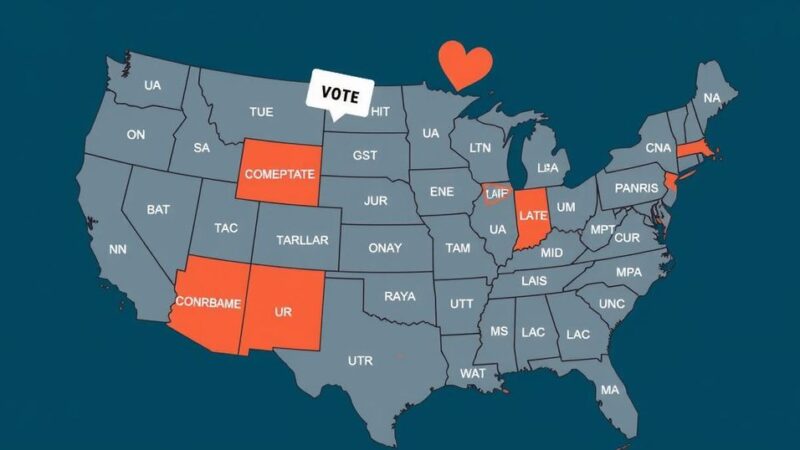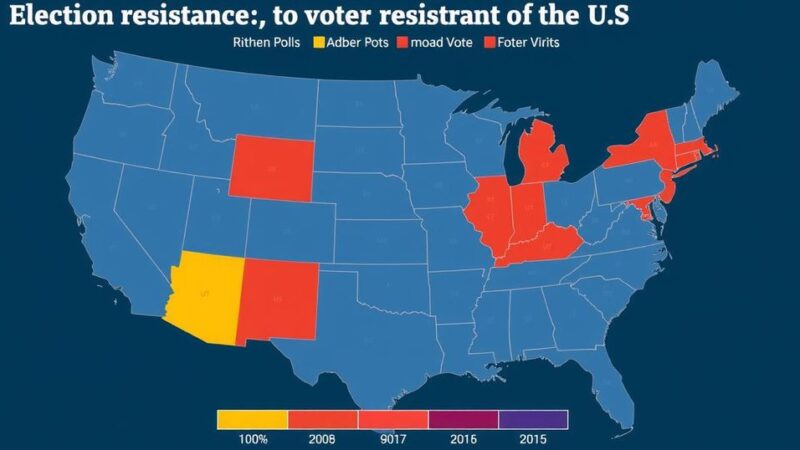Growing support for Donald Trump among Arab American voters in Michigan stems from dissatisfaction with Kamala Harris and the Biden administration’s policies regarding Israel and Palestine. Activists criticize the Democrats for taking their votes for granted, advocating for a shift towards Trump despite his historically contentious rhetoric. The community is increasingly asserting its influence as the election nears, showcasing the importance of addressing their concerns to secure their electoral backing.
The political landscape among Arab American voters in Michigan is experiencing a significant shift as many express growing support for Donald Trump ahead of the upcoming United States election. This transition is heavily influenced by the community’s dissatisfaction with Democratic candidate Kamala Harris’s stance on the ongoing conflict involving Israel and Palestine, particularly the war in Gaza and Lebanon. Activists, such as Samraa Luqman, argue that if Harris loses, it would largely be due to the Arab American community’s response to the perceived negligence from the Democratic Party, which they feel has taken their votes for granted. Luqman contemplates her support for Trump, despite his controversial history regarding Muslims and immigrants. She emphasizes a stark contrast with Harris, stating that supporting her amounts to a 100 percent guarantee of continued violence in the Middle East. In contrast, Trump is perceived as a candidate offering at least a small chance for change. His recent outreach efforts in Dearborn, Michigan, a city with a significant Arab American population, have allowed him to garner attention despite past criticisms from the community. Trump’s visit served to highlight this shift, where Arab American business owners and activists voiced their views on the Israeli-Palestinian conflict. Many expressed a desire for relief in the region, claiming that Trump’s past presidency was characterized by peace initiatives contrasted with his promotion of aggressive policies towards Muslim-majority nations. Moreover, while many in the community are embracing Trump as a possible advocate for their concerns, critics argue that his policies have historically favored Israeli interests at Palestinian expense. The current political climate has become a catalyst where local figures, including mayors with Arab heritage, openly endorse Trump seeking a reprieve from the status quo under Biden. As the election unfolds, Arab Americans in Michigan represent a pivotal electoral bloc that may significantly impact the outcome. The narrative surrounding Trump is intricate, balancing community sentiments against a backdrop of complicated historical realities. As sentiments of betrayal and neglect towards Harris grow, a considerable faction of Arab voters is poised to redefine their political alignment in a bid for visibility and accountability, potentially reshaping future electoral dynamics.
In recent years, Arab American voters have traditionally leaned towards the Democratic Party due to shared views on social and humanitarian issues. However, the current geopolitical landscape, particularly the events in Gaza and Lebanon, has provoked a reconsideration of loyalties. The Biden administration’s approach, characterized by unwavering support for Israel, has disillusioned many voters within this community. Activists feel that their voices and concerns are being marginalized in the broader political discourse, leading to a search for alternatives. This changing political allegiance represents a critical moment where voters are asserting their influence in the electoral process and demanding accountability from candidates they feel have previously overlooked their needs.
In summary, the trends among Arab American voters in Michigan indicate a notable realignment towards Donald Trump as many express frustration with the Democratic leadership, particularly regarding the Israel-Palestine conflict. This shift stems from a desire for change and accountability as well as a reaction to perceived negligence from the Democratic Party. As the election approaches, the Arab American community may emerge as a crucial player in determining the fate of candidates, signaling a need for both major parties to address their concerns effectively to harness their support in the future.
Original Source: www.aljazeera.com






